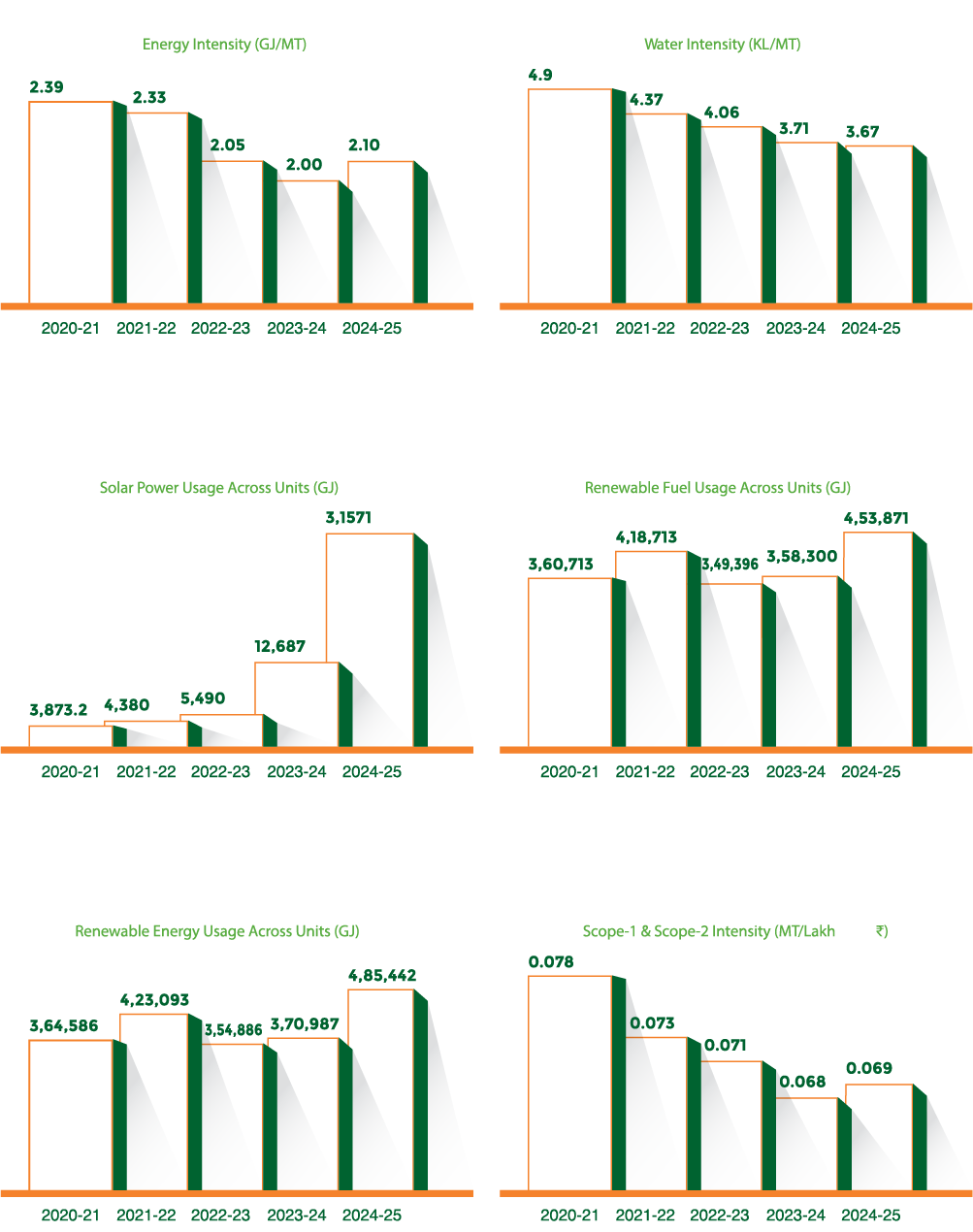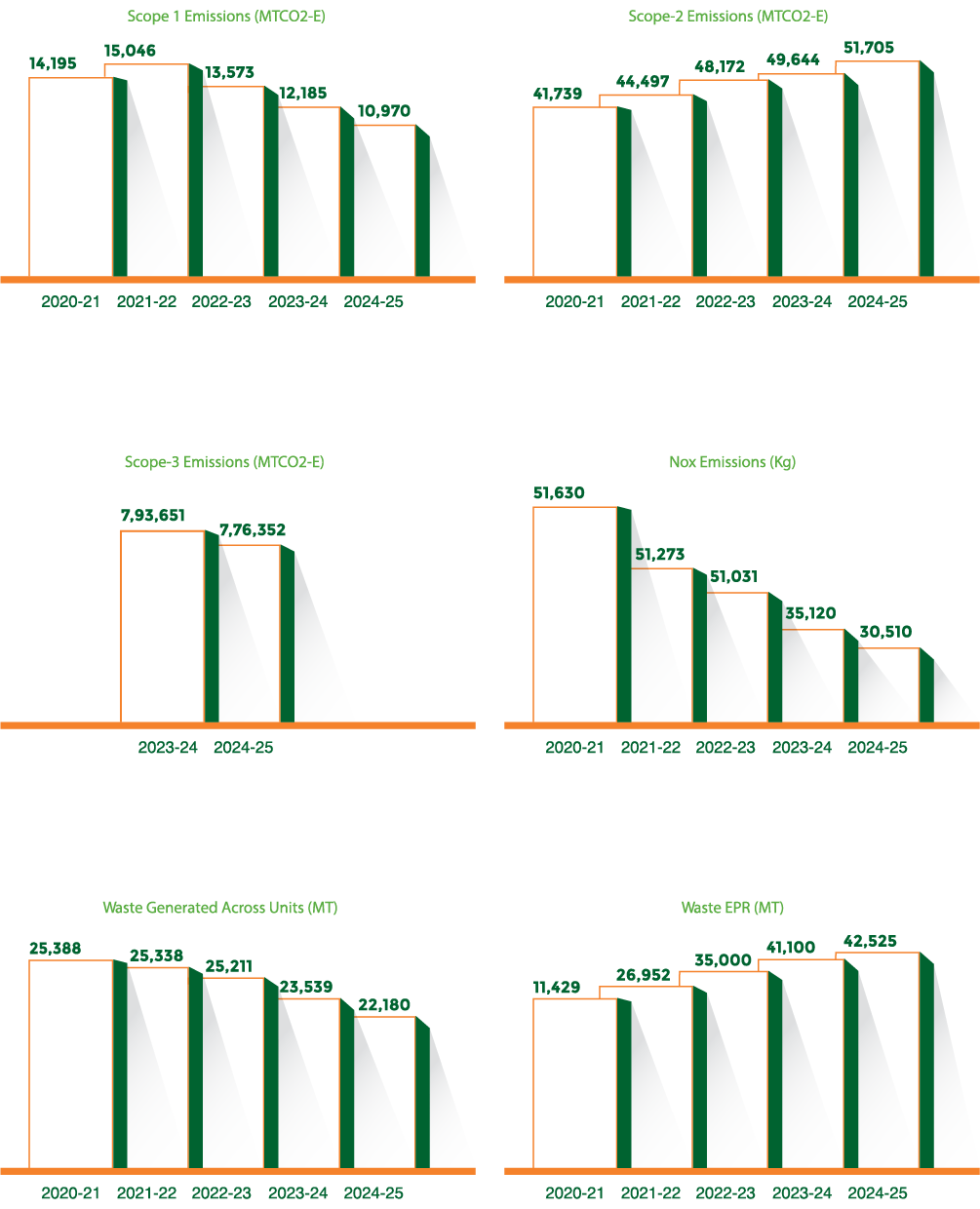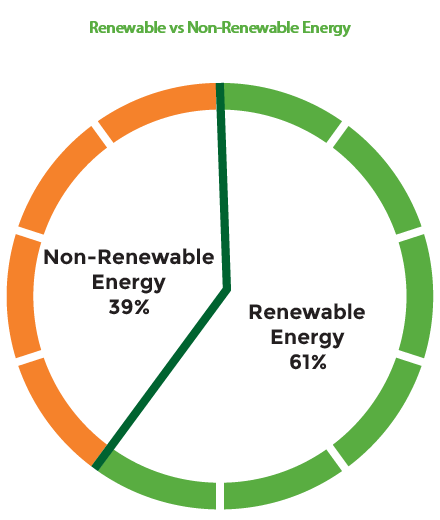Natural Capital
Our approach to Natural Capital reflects a deep-rooted commitment to environmental stewardship and long-term sustainability. Guided by our ambition to achieve Net Zero Emissions by 2045, we continue to embed energy efficiency and renewable energy adoption across our manufacturing sites and offices. These efforts are not only reducing our environmental footprint but also building a resilient and future-ready energy framework. By integrating sustainability into our core operations, we are actively contributing to a cleaner, greener planet for generations to come.
As part of our commitment to responsible operations, we also ensure that our manufacturing units and offices are not located in or around ecologically sensitive areas such as national parks, wildlife sanctuaries, biosphere reserves, wetlands, biodiversity hotspots, forests, or coastal regulation zones.
Performace Highlights
2X INCREASE
in reuse of treated water in secondary processes from FY 2023-24
ACHIEVED 30% REDUCTION
in Water Intensity, one year ahead of publicly committed timelines
3.5X INCREASE
in Water Conservation capacity within the community to 9,44,697 KL
ACHIEVED 12%
Reduction in Energy Intensity
61% ENERGY CONSUMED
comes from renewable sources (Scope 1& 2), one year of publicly committed timelines
WATER CONSERVATION CAPACITY
within our factories enhanced to 2,47,589 KL
42,525 MT
of Post-Consumer Plastic Waste Collected, Processed & Recycled, thereby sustained plastic positivity
Energy Efficiency: Powering Sustainable Growth
As one of India’s most respected consumer goods companies rooted in nature and Ayurveda, we understand that responsible energy use is essential for securing long-term value, reducing environmental impact, and aligning our growth with global climate priorities. In a world where energy consumption patterns are under increasing scrutiny, our ability to drive energy transformation within our operations reflects both our environmental stewardship and our commitment to operational excellence.
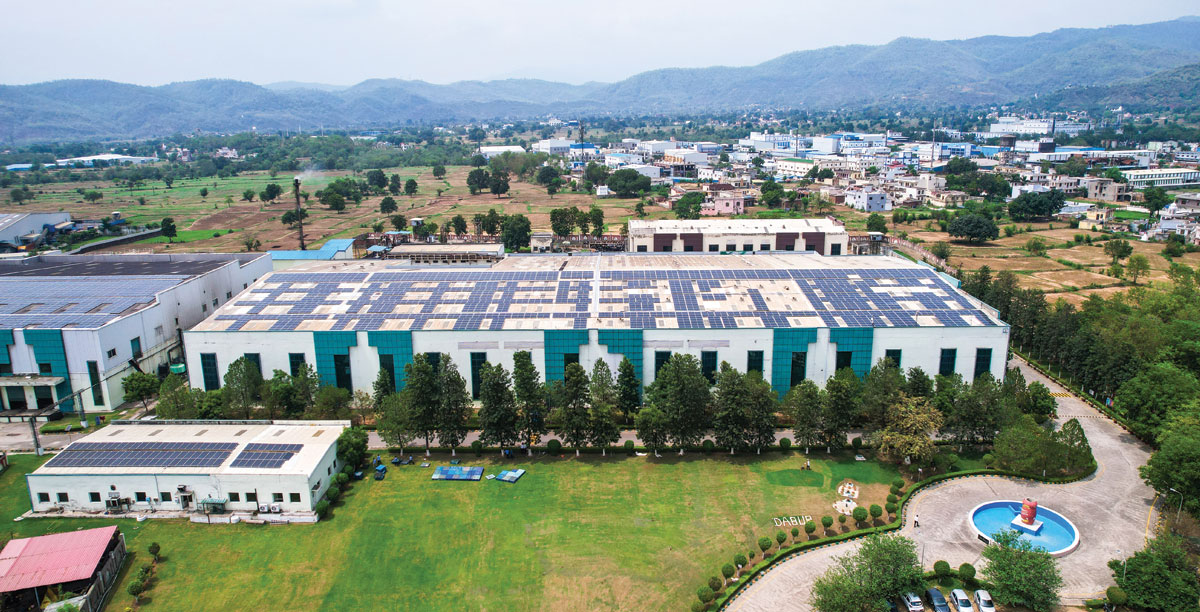
The manufacturing of food and beverages is inherently energyintensive. Yet, through sustained efforts and smart investments, we have significantly improved our energy performance. In FY 2024-25, Dabur reduced its energy intensity by 12% compared to our baseline year - an achievement that underscores the depth of our commitment and the effectiveness of our approach.
Throughout the year, we made focused interventions to enhance energy efficiency across our facilities. High-efficiency motors and advanced process equipment were introduced to improve productivity while lowering energy demand. Lighting systems were upgraded with energy-efficient LEDs, and Variable Frequency Drives were implemented across operations to precisely regulate motor speeds, optimising power usage.
We also undertook a systematic overhaul of our compressed air systems, a major source of energy consumption. By reengineering piping layouts, implementing pressure-based VFD control, and eliminating leakages, we achieved substantial reductions in energy waste. Simultaneously, we advanced our shift from fossil fuels to greener fuels by installing high-efficiency biomass boilers supported by waste heat recovery systems such as air preheaters and economisers. This has allowed us also to use most of our herbal waste as fuel in our boilers. These measures not only reduce emissions but also improve thermal efficiency. In parallel, we deployed Internet of Things (IoT) solutions and AI-based monitoring tools to oversee boiler operations in real time, ensuring tighter control and sustained energy savings through condensate recovery and parameter-based operation.
Our progress in energy efficiency has been matched by a resolute transition to renewable energy. In FY 2024-25, we achieved a notable 1,000 bps increase in renewable energy usage, with 61% of our total energy consumption sourced from renewable sources, surpassing our publicly stated target for FY 2025-26, a full year ahead of schedule. This shift has materially contributed to the reduction of our Scope 1 and Scope 2 greenhouse gas emissions.
Among the year’s most significant milestones was the transformation of our Ghaziabad corporate office into a facility powered entirely by solar electricity. Similarly, our Sahibabad Manufacturing Facility became the first manufacturing unit within the Dabur network to operate entirely on solar energy, setting a benchmark in our journey toward carbon neutrality.
In continuation of its holistic approach, Dabur focused on mitigating Scope 1 and Scope 2 emissions during the year. Recognising that real impact requires a system-wide approach, we broadened our monitoring systems to include not just production plants but also ancillary infrastructure such as offices, warehouses, and employee housing. This comprehensive visibility has allowed us to identify and act upon opportunities for efficiency and emission reduction across the entire value chain.
As part of its ongoing efforts to reduce energy consumption, Dabur has been prioritising energy efficiency and the integration of green energy within its operations. Today, over 90% of our fossil fuel-based boilers across our network have been replaced with biomass alternatives. This transition, combined with our expanding use of green electricity, underscores Dabur’s decisive pivot towards low-carbon energy systems. Additional investments are planned for the upcoming year to consolidate and build on this momentum.
As we look ahead, Dabur remains steadfast in its commitment to energy efficiency and green innovation. Our achievements in FY 2024-25 are not just milestones; they are markers of a future-focused strategy that balances business resilience with environmental responsibility. By embedding sustainability into the core of our operations, we are not only safeguarding our natural resources but also creating enduring value for our stakeholders.
Dabur acknowledges the significance of water as a vital natural resource. In line with our Environmental, Social, and Governance (ESG) commitment, we have implemented comprehensive water conservation measures across our production sites and value chain. Our approach encompasses monitoring water data not only at manufacturing sites but also at non-production facilities, including offices, warehouses, nurseries, and employee dormitories.
Our strategy integrates robust monitoring systems and the 3R principle (Reduce, Reuse, Recycle) to drive efficiency, reduce freshwater dependency, and maximise the use of recycled water. This comprehensive framework enables us to identify inefficiencies, minimise losses, and embed sustainability into every layer of our operations.
We have achieved a 30% reduction in water intensity across India over the past six years, despite our significant and growing beverage portfolio. Further, this 30% achievement was a public commitment, which has been achieved 1 year ahead of the stated timeline.
In alignment with our public commitment to become water positive by 2030, Dabur has already created a water conservation and recharge capacity equivalent to ~85% of our total water abstraction and consumption. This achievement is driven by a combination of in-house initiatives and community-based water projects — represents a 4.5X improvement in just 24 months, keeping us well on our way to water positivity well ahead of our stated public commitment by 2030.
Our journey toward water positivity is not just about meeting targets; it is about building resilience, empowering communities, and securing a sustainable future for all.
At Dabur, water stewardship is a cornerstone of our environmental strategy. Guided by the 3R principle of Reduce, Reuse, Recycle, we continue to embed water efficiency across our operations. Our manufacturing units have implemented a suite of advanced technologies and process innovations to reduce freshwater dependency and enhance circularity in water use.
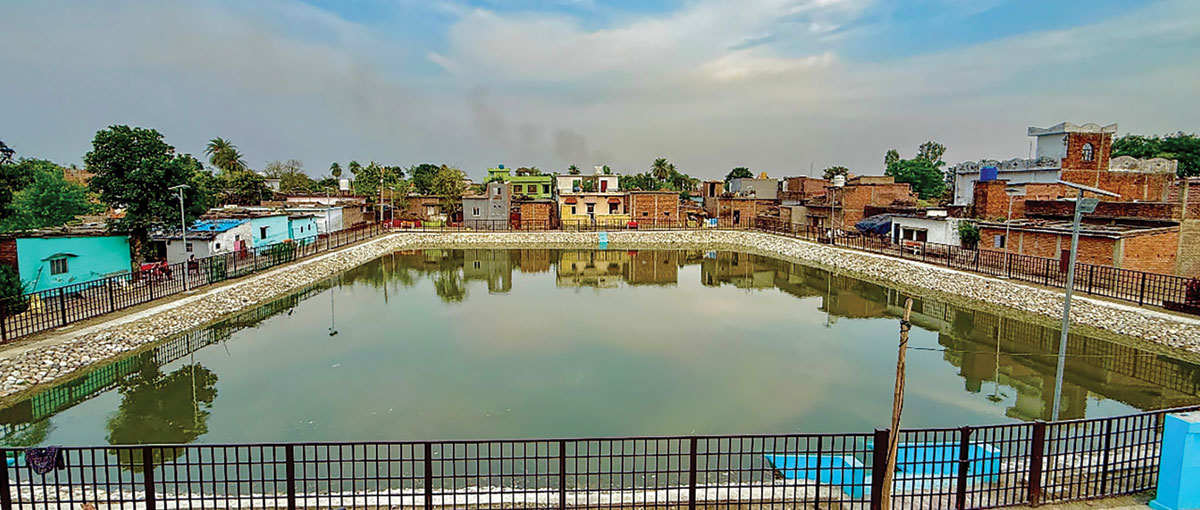
Key initiatives undertaken during FY 2024–25 include
- Doubling the reuse of treated water in secondary processes compared to FY 2023–24.
- Deployment of multi-stage RO plants with recovery rates exceeding 90% as against 70% for conventional RO plants, significantly reducing raw water extraction.
- Installation of UF and RO systems to recycle ETP-treated water for reuse in non-potable applications.
- Utilisation of RO reject water in secondary processes to further minimise raw water extraction.
- Adoption of water-efficient fixtures, including aerators, dual-flush toilets, and waterless urinals, across facilities.
- Rainwater harvesting systems installed at multiple sites, enabling groundwater recharge or reuse in secondary processes based on local conditions.
- Steam condensate recovery systems to capture and reuse thermal energy and water.
- Digital flow meter systems for real-time monitoring and optimisation of water usage.
Together, these efforts underscore Dabur's commitment to responsible water management, operational efficiency, and environmental sustainability.
Dabur undertook a comprehensive water risk assessment in 2023-24, covering 100% of the domestic manufacturing operations. This evaluation was conducted using the World Resources Institute’s aqueduct tool alongside parameters defined by India’s Central Ground Water Board. The assessment considered a broad spectrum of physical water risk indicators, including water stress, depletion, interannual and seasonal variability, as well as drought and flood risks.
To strengthen our long-term water stewardship strategy, we also conducted forward-looking scenario analyses for the years 2030 and 2050. These analyses were based on three climate pathways:
- Pessimistic (SSP5 RCP8.5): Projected temperature rise of 3.3°C to 5.7°C by 2100
- Business-as-Usual (SSP3 RCP7.0): Projected rise of 2.8°C to 4.6°C
- Optimistic (SSP1 RCP2.6): Projected rise of 1.3°C to 2.4°C
These scenarios offer critical insights into potential future water-related risks, enabling Dabur to proactively design and implement robust mitigation strategies.
At Dabur, our packaging strategy is guided by the principles of circularity and sustainability. We are committed to reducing reliance on fossil-based, finite resources by transitioning to materials that are renewable, recyclable, or capable of carbon storage. This approach is deeply aligned with our broader environmental goals of resource efficiency and waste minimisation.
To support this transition, we have integrated digital solutions across our operations, promoting paperless meetings, digitising documentation workflows, and using QR codes for goods invoicing. Awareness and training initiatives have also been rolled out to encourage responsible paper usage, including double-sided printing where necessary.
In FY 2024–25, Dabur made significant strides in sustainable packaging with a series of impactful initiatives. We utilised over 700 MT of recycled PET (RPET), introduced 100% recycled PET in Hajmola jars and Amla Hair Oil (30ml) bottles, and adopted recyclable structures for Gulabari soap. Notably, we incorporated 100 MT of recycled LDPE into shrink films, further reducing our plastic footprint. Innovations like aseptic PET bottles for Coconut Water and Real Bite in 100% recyclable aluminium cans further enhanced recyclability.
Additionally, we saved 561 tons of packaging material through optimisation efforts. Our strategy focused on weight optimisation, glass-to-plastic transitions to lower carbon footprints, and paper savings by repurposing 209 tons of outer CFB boxes for inter-plant finished goods movement, demonstrating our commitment to circular practices across categories. We also improved consumer convenience by shifting Dabur Hingoli’s packaging to a PP (Polypropylene) cap.
To promote responsible disposal, we are adding recycling and disposal logos across all primary and secondary packaging. With a time-bound commitment to incorporate 15-30% RPET in personal care PET bottles, and collaborations to develop recyclable laminates and recycled-content label substrates, Dabur continues to lead with purpose in reducing packaging-related environmental impact.
Dabur recognises the pressing environmental and public health challenges posed by untreated plastic waste. In alignment with our commitment to sustainability and circular economy principles, we have implemented a robust, pan-India Extended Producer Responsibility (EPR) framework since 2016. This model is executed in partnership with certified waste management agencies and is designed to ensure responsible collection, recycling, and disposal of post-consumer plastic waste.
Dabur had achieved the distinction of being the first Indian FMCG company to achieve Plastic Waste Neutrality in 2021-22 and Plastic Waste Positivity in 2022-23. In FY 2024–25, Dabur achieved a significant milestone by recycling 70% of its post-consumer plastic waste and safely disposing of the remaining 30% through waste-to-energy and cement co-processing channels. Notably, we maintained our status as a 'Plastic Waste Positive' company by processing >100% of the plastic waste generated through our product packaging.
At Dabur, sustainability isn’t an add-on, it’s embedded in how we think, operate, and grow. We firmly believe that Reducing, Reusing, Recycling, and Responsibly Managing waste are foundational to sustainable development and environmental stewardship. As we Corporate Overview Board & Management Reports Financial Statements navigate a world of finite resources and rising environmental expectations, we are reimagining our operations through the lens of circularity. Our approach goes beyond compliance, focusing on minimising waste, conserving resources, and reducing the environmental footprint of our operations.
We are actively integrating circular economy principles across our value chain — from sourcing and manufacturing to packaging and post-consumer recovery. Every Dabur manufacturing facility in India operates in full alignment with all applicable regulations and is backed by globally recognised certifications:
- ISO 14001 for Environmental Management
- ISO 45001 for Occupational Health & Safety
- ISO 9001 for Quality Management
These certifications are more than credentials. They are a reflection of our commitment to operational excellence, employee safety, ESG responsibility and continuous improvement. As we continue to scale, we remain focused on building systems that are not only efficient but regenerative, ensuring that our growth contributes positively to the planet and the communities we serve.
Beyond compliance, Dabur has taken a leadership role in fostering community engagement through its Extended Citizen Responsibility (ECR) initiatives. These programmes, aligned with the Swachh Bharat Mission and Sustainable Development Goals (SDGs), empower individuals and communities to actively participate in plastic waste management. Campaigns such as “My 10 Kg Plastic” have mobilised citizens across 13 districts across Delhi-NCR and Jammu to segregate, collect, and responsibly dispose of plastic waste. Some of the key community-level plastic waste management initiatives include:
My 10kg Plastic: Driving Community-Led Sustainability
As part of our ongoing commitment to environmental responsibility, Dabur, in collaboration with the Indian Pollution Control Association (IPCA), continued to strengthen its flagship community-level waste management initiative ‘My 10 Kg Plastic’ during FY 2024-25.
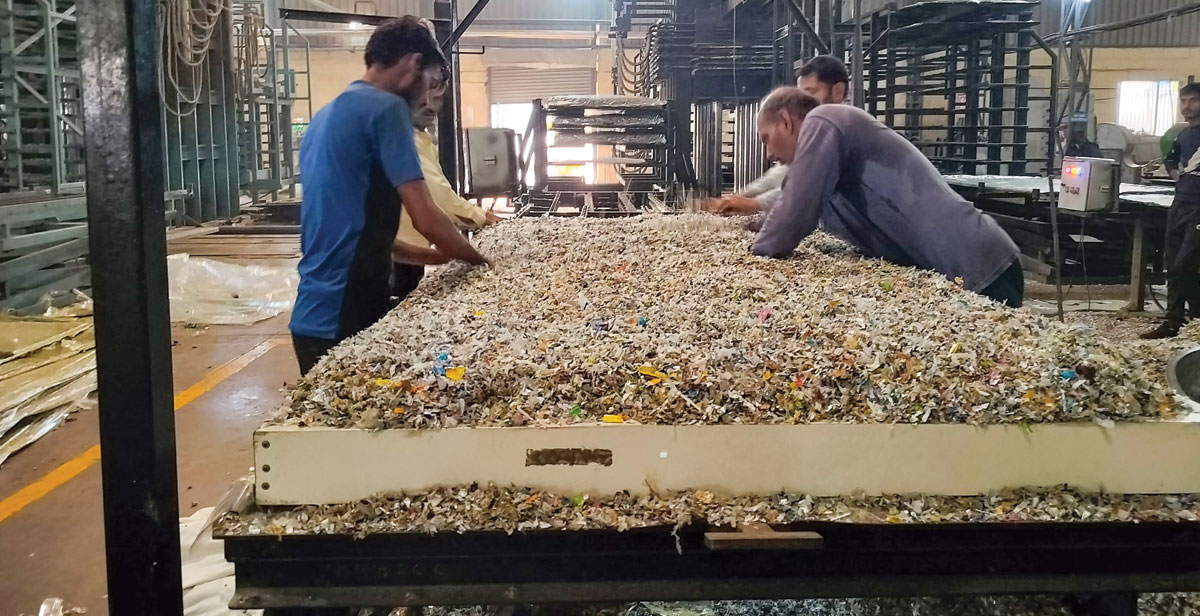
The programme encourages households to contribute at least 10 kg of plastic waste annually, fostering a culture of responsible consumption and disposal. This year, the initiative collected 98,052 kg of plastic waste, which was efficiently channelled for recycling and further processing.
Plastic waste collection bins have been installed in selected areas of Delhi-NCR and Jammu, enabling proper segregation of plastic waste at the source. In parallel, door-to-door plastic waste collection was implemented in parts of Delhi, Jammu, and Patiala, ensuring that the segregated waste is collected, processed, and disposed of responsibly.
With three daily household pick-up schedules, the campaign has ensured regular collection while fostering convenience and consistency for participants. More than 70,500 individuals have actively participated, and over 1,400 households have become permanent contributors to the movement.
Significant outreach was achieved across regions, with 70,000 households and institutions in Delhi and 500 in Jammu benefiting from the programme. Beyond collection, My 10 Kg has become a catalyst for behavioural change, instilling sustainable habits and environmental consciousness within communities.
This behavioural shift has led to:
- A reduction in landfill burden
- Lower health risks for waste workers due to safer handling of sorted waste
- Higher recovery of recyclables, increasing operational efficiency
- A boost in per capita income for waste workers, thanks to improved quality and volume of recyclable materials
Since its launch, the initiative has surpassed a major milestone, with total plastic waste collection crossing 200,000 kg, marking a tangible step forward in Dabur’s mission is to build a greener, cleaner India through collective action and community empowerment.
Green Pathways: Empowering Communities Through Waste Awareness
As part of Dabur’s continued efforts to build environmentally responsible communities, the ‘Green Pathways’ initiative, run in collaboration with the NEPRA Foundation, delivered targeted interventions to promote waste awareness, hygiene, and sustainable living across urban and rural areas.
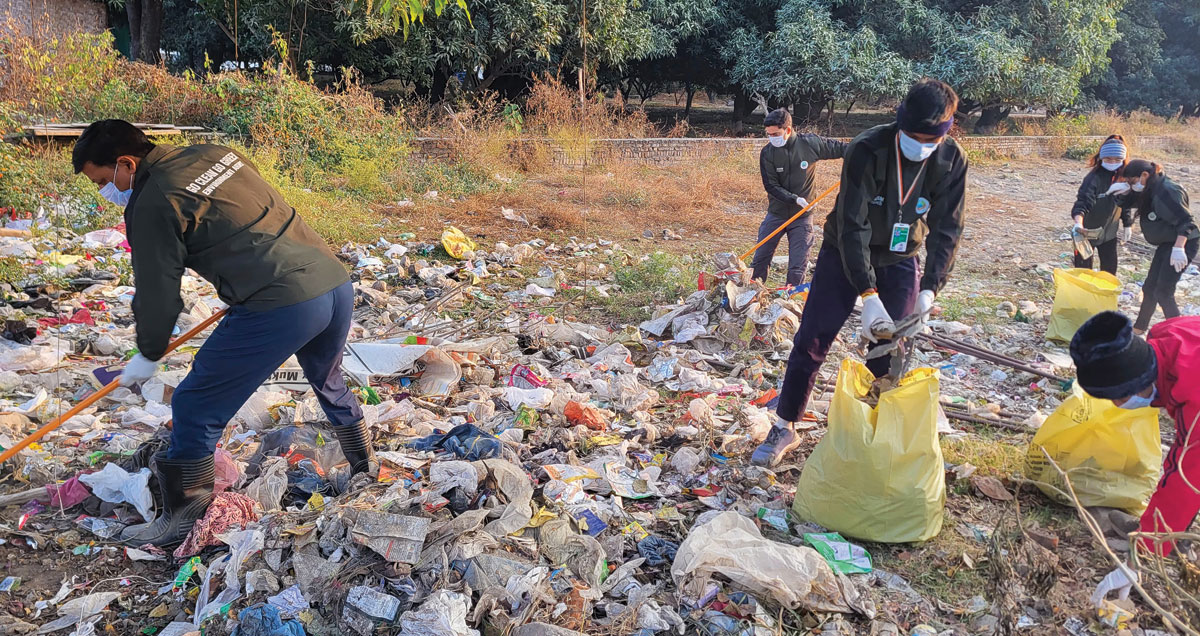
In 2024-25, a series of impactful community engagement activities were carried out, which included:
- Waste Picker Empowerment: In Vapi, waste pickers were equipped with Personal Protective Equipment (PPE) and received comprehensive safety training, enhancing both their health and dignity. Special focus was placed on female waste pickers by organising Menstrual Health and Hygiene (MHH) sessions, which helped break social taboos and encouraged better self-care practices among women.
- School Engagement: Interactive workshops were organised for students from Prathmik Shalas in Sanand and Mehsana villages of Gujarat on waste segregation, recycling, and the importance of reducing waste. Over 1,000 students participated in these sessions that sought to cultivate eco-conscious values among the next generation. Children were also engaged in activities like the “Waste Sorting Game”, making the learning both fun and impactful. To emphasise the idea that waste can be transformed into something purposeful, each student received a pencil made from recycled newspaper embedded with seeds—a powerful symbol of renewal and environmental stewardship. These sessions aimed to sow the seeds of sustainability in young minds, inspiring them to take everyday actions for a cleaner future.
- Community Engagement at the Grassroots Level: In six villages, each across Sanand and Mehsana, our teams conducted door-to-door campaigns, sensitising families on adopting sustainable waste management practices, encouraging long-term behavioural change at the grassroots level, promoting the importance of source segregation and household-level waste management. Open, friendly discussions created space for dialogue and learning, encouraging families to take responsibility for their environmental impact.
- Creative Sustainability with Children: At the Hatkeshwar Support Education Centre, the initiative focused on empowering children — especially those from waste-picker families — through creative and skill-based learning. Children under 12 participated in festive celebrations that blended tradition with sustainability. During Diwali, for instance, they crafted vibrant lanterns, diyas, and wall hangings using old fabric and recycled paper. For Raksha Bandhan, they created eco-friendly rakhis from textile scraps, each piece reflecting their creativity and joy. These activities not only brought joy and pride but also helped children understand the value of reuse and resourcefulness. Celebrations became a platform for skill-building and sustainability education, offering lasting lessons along with memorable moments.
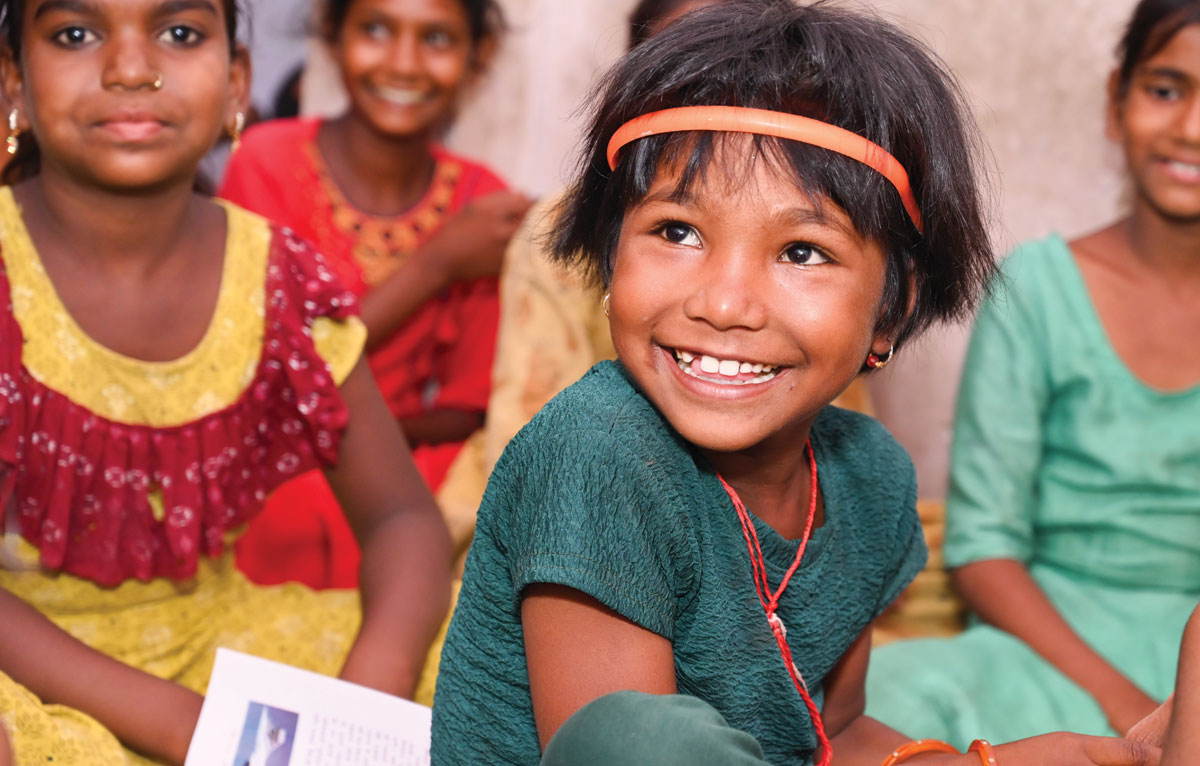
These initiatives have not only fostered environmental stewardship, but also empowered marginalised communities, particularly women and children, by equipping them with knowledge and tools for a healthier, more sustainable future. With such programmes, Dabur continues to drive meaningful change in alignment with its broader CSR vision of inclusive, community-led development.
Safeguarding the Hands that Keep our Cities Clean
At Dabur, we recognise that true sustainability begins with the health and dignity of the communities we serve. Through targeted interventions, we are working to uplift vulnerable groups by promoting hygiene awareness and improving access to essential healthcare.
To support the often-overlooked contribution of waste pickers, we organised Health and Hygiene Awareness sessions along with NEPRA Foundation focused on the safety and wellbeing of the waste collectors. These interactive sessions covered simple yet vital practices such as handwashing techniques, use of protective gear, safe waste handling, and basic first aid for injuries and cuts. Through live demonstrations and open discussions, we empowered participants with practical knowledge to help prevent illness and injury, ensuring that those who help keep our cities clean can do so safely and with dignity.
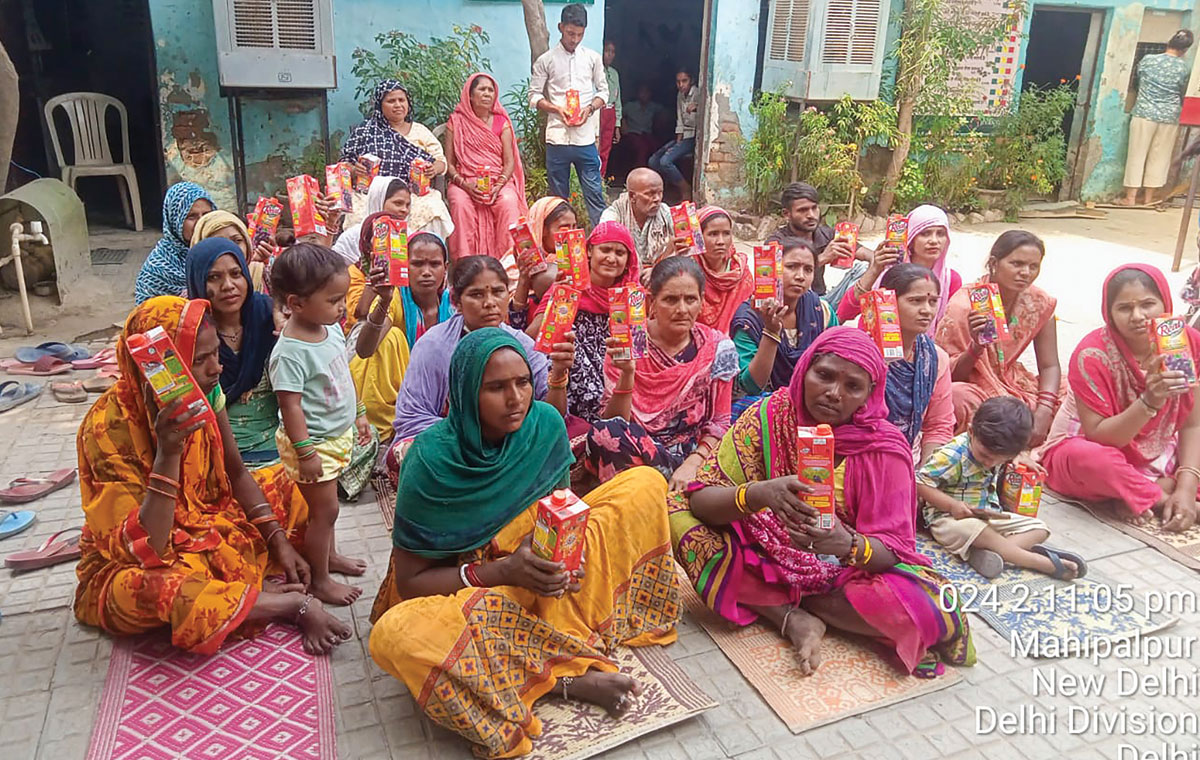
In partnership with Bal Vikas Dhara, we run an Arogya Health Centre in Mahipalpur on the outskirts of Delhi, providing free gynaecological consultations and subsidised essential medicines to underserved communities. The centre has become a trusted source of care, addressing a wide range of health concerns including:
- Women's health issues such as UTIs (urinary tract infection), mastitis, and abnormal uterine bleeding
- Chronic illnesses like diabetes, hypertension, and vision problems
- Common infections and injuries, including sore throat, conjunctivitis, fungal infections, and pain management
- Nutritional and behavioural concerns such as pica and anorexia
Over the years, the centre served 1,751 patients, reaffirming our commitment to accessible, inclusive healthcare for all.
In partnership with Sarthak Welfare Society, Satna (M.P.), we organised a series of impactful public welfare initiatives to build awareness among the waste collector community on critical issues like health, education, substance de-addiction, and sustainable livelihood opportunities.
Basic health screenings on blood pressure, blood sugar, and eye tests were conducted for ragpickers through dedicated health camps, ensuring improved access to essential healthcare services. Street plays, or Nukkad Nataks, were organised to raise awareness on health, de-addiction, and environmental conservation, fostering behavioural change at the grassroots level.
Together, these initiatives reflect Dabur’s mission to not only care for the planet, but also for the people who live on it, especially those at the grassroots who form the backbone of our society.
Nurturing Young Lives Through Nutrition and Health Education
At Dabur, we believe that good health and proper nutrition form the foundation of a child’s overall development. As part of our ongoing commitment to child welfare, we provided nutritious food support to waste collector families and their children, ensuring the wellbeing of kids from underserved backgrounds.
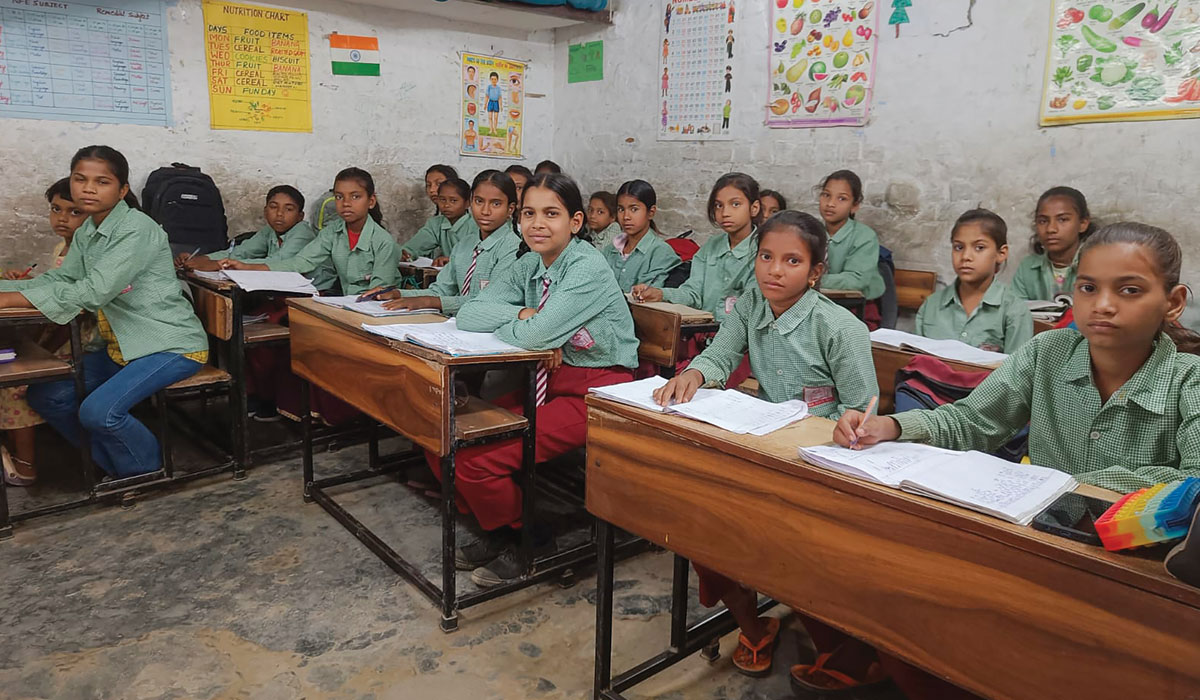
Children received a thoughtfully curated mix of dry nutrition items, including fruits, roasted chickpeas (bhuna chana), peanuts, biscuits, and nutritious products, helping to support their physical growth and daily energy needs.
Beyond nutritional support, our educators played a pivotal role in promoting health awareness among children. Through engaging sessions, children were taught the basics of personal hygiene, the importance of a balanced diet, and how regular physical activity contributes to a healthy lifestyle. This holistic approach not only strengthened their immunity but also empowered them with knowledge to make healthier choices in the long term. By combining nutrition with education, we aim to build a healthier, more informed generation, one child at a time.
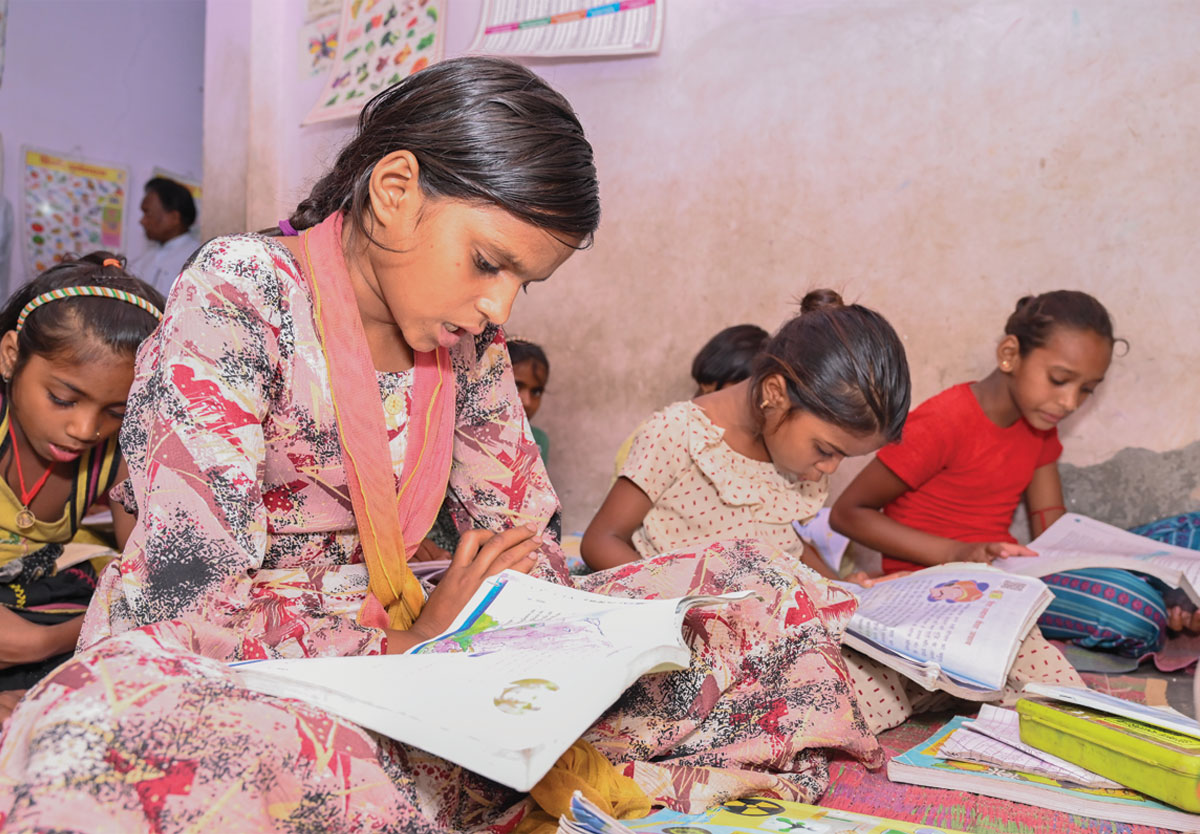
Asha Ki Kiran: Bridging the Education Gap for Children of Ragpicker Families
As part of our continued efforts to uplift marginalised communities, the Asha ki Kiran initiative has been working towards creating meaningful change in the lives of children from ragpicker families — many of whom are unable to access formal education due to financial and social barriers.
Operated by Bal Vikas Dhara and supported by Dabur, the primary goal of this Non-Formal and Remedial Education Centre is to bridge learning gaps and prepare out-of-school children for eventual mainstream school enrolment. Tailored for children aged 5 to 12 years, the programme helps learners catch up with the school curriculum they’ve missed, building a strong foundation for their academic reintegration.
The focus is not just on academics but also on the overall development of the 150 children enrolled at the centre. Dedicated sessions are organised to prepare children for school examinations and strengthen their understanding of key subjects. We also undertake regular tracking of height and weight to monitor children’s growth and ensure nutritional needs are being met. Games like Kho-Kho, Kabaddi, Football, and races were also organised to help promote teamwork, physical fitness, and enthusiasm among children. Besides, drawing sessions gave children a platform to express their thoughts and emotions creatively, nurturing imagination and fine motor skills.
This initiative seeks to not just provide education, but also restore hope and dignity to children from the waste-picking community, empowering them with the tools, support, and confidence to build a brighter, more secure future.
Community Awareness Drives
As part of our ongoing commitment to inclusive development and social responsibility, Dabur partnered with Sarthak Welfare Society to conduct a series of community workshops aimed at fostering awareness and wellbeing across diverse groups.
As part of this programme, a workshop was held at Central Jail, Rewa, where children of inmates were provided with warm clothing and footwear. The session also included health awareness activities to promote hygiene and preventive care.
Interactive sessions were conducted to educate the community on the environmental impact of plastic waste, emphasising cleanliness and the importance of reusing materials. A similar awareness session was held at the primary school in Kripalpur, encouraging students to adopt sustainable practices through education on cleanliness and reuse.
Dedicated training sessions were conducted for ragpickers at the dump yard, covering topics such as hygiene, de-addiction, and environmental stewardship. In collaboration with Rewa Municipal Corporation, a workshop was also organised for ragpickers, focusing on road safety and environmental conservation.
Diwali Dry Waste Collection Drive
The ReCircle Diwali Dry Waste Collection Drive was organised for the fourth successive year, where we collected 20,000 kg of used goods and clothes. Riding on the overwhelming community support, we collected over 45,664 kg of dry waste and old clothes during this festive season drive, underscoring our commitment to responsible waste management and environmental stewardship.
The collected waste was transformed into meaningful proceeds, which were donated to St. Catherine of Siena School and Orphanage. These contributions are helping brighten the lives of over 260 children, providing them with essential resources and the hope of a better future.
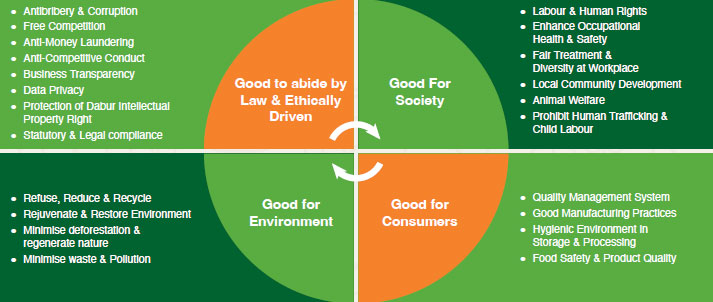
At Dabur, we are committed to building strong, ethical, and sustainable partnerships with our Value Chain Partners. Responsible sourcing is deeply embedded in our business philosophy; we aim to ensure decent labour conditions, environmentally conscious practices, and adherence to ethical norms throughout our value chain. This commitment is articulated in our Supplier Code of Conduct (SCOC).
We procure a wide array of raw materials, including honey, amla, sugar-jaggery, vegetable oils, fruit pulps and concentrates, maize derivatives like sorbitol and dextrose monohydrate, aromatic essential oils, psyllium husk, spices, medicinal herbs, gold and silver, and a variety of packaging materials—ranging from paper-based mono-cartons and corrugated boxes to polymer-based materials like PET, HDPE, PP, and flexible formats such as laminates, labels, sleeves, glass bottles, and metal caps. Our sourcing strategy is centred around three core pillars: cost efficiency, material availability, and sustainability.
Aligned with our responsible sourcing policy and the broader ESG framework, we anchor our procurement practices in four foundational principles: social responsibility, environmental stewardship, consumer wellbeing, and regulatory compliance. We conduct regular risk assessments of our key material categories to ensure that sustainability is an integral factor in sourcing decisions.
We have set a target to achieve 100% sustainable sourcing of high deforestation-risk materials—including beverage cartons, paper, and palm oil — by FY 2025–26. In FY 2024–25, we achieved a 93.36% sustainable sourcing rate for these materials, marking significant progress toward this goal.
As part of our biodiversity and sourcing strategy, we are committed to achieving 100% mitigation of risks associated with critically endangered herbs such as Gugal and Aconite by FY 2025–26. We are pleased to report that in FY 2024–25, Dabur has successfully achieved full mitigation (100%) of these risks through sustainable sourcing practices, including contract farming and conservation-based initiatives.
Significant developments during the year were:
- By Business Value, 66% of value chain partners comprised of RM/PM vendors, 15% accounted for contract manufacturers, and the balance by other service vendors
- Purchase from trading houses contributes 15% of the total purchase value
- 20% of the total Packing material (Excluding Juice Laminates) consumed are from the recycled and reused input materials. Juice Laminates are 100% sustainably sourced from FSC-certified value Partners.
- We conducted 5 training sessions comprising 63.75% of value chain partners (By Value of Business) on following topics (1) Supplier code of Conduct (2) Assessment and compliance expectation (3) Sustainable sourcing and preferential sourcing policy. These training programs covered the principles related to legal compliance, quality and safety, Human rights management system, environmental, sustainability and ethics and business conduct, etc.
- We have completed assessment of 64% of the Value chain partners for Health & Safety Practices, Working Conditions, Sexual Harassment, Discrimination at workplace, Child Labour, Forced Labour/Involuntary Labour, wages and environmental impact.
- 36% of the total purchases are from the MSMEs or Small producers
- Sourcing from India contributes 86% by value
- 30.97% of the total purchases are sustainably sourced
- 5.7% of the total purchases from the Vulnerable/Marginalised Groups/Individuals
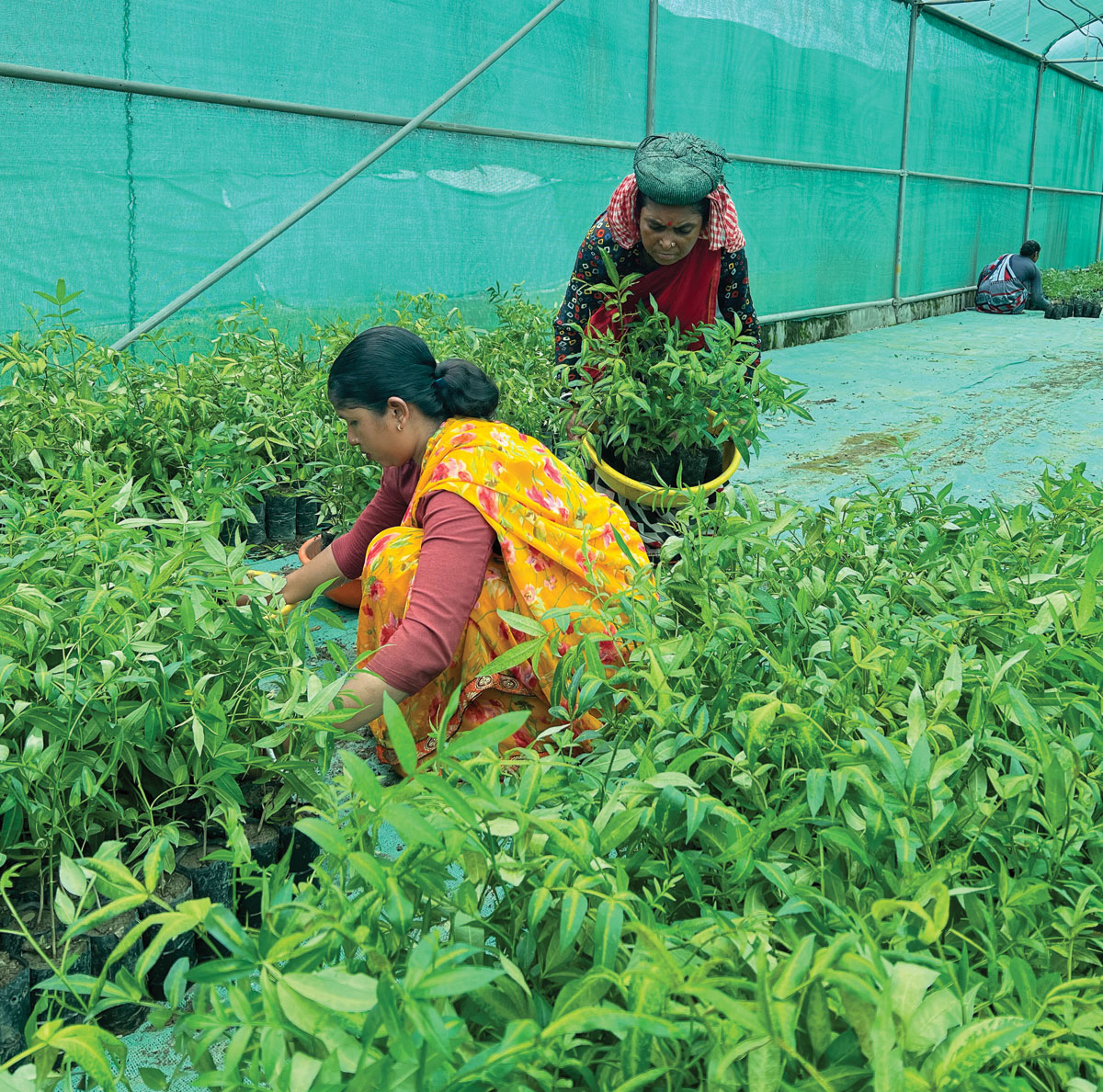
Our commitment to biodiversity conservation stems from a fundamental belief: Nature is not merely a source of our ingredients — it is the foundation of our purpose. As a company deeply connected to the natural world, we recognise our responsibility to protect, restore, and enrich the ecosystems that sustain us.
In FY 2024–25, we made significant progress on our biodiversity agenda through initiatives designed to create lasting ecological and social value. We expanded sustainable agronomy practices across 13,191 acres of land pan-India — a significant increase over FY 2023–24. With this, we are steadily progressing toward our goal of sustainably cultivating these plants across 15,000 acres by FY 2029–30.
During the year, Dabur engaged 12,753 farmers in the cultivation and sustainable collection of medicinal and aromatic plants, as well as Non-Timber Forest Products (NTFPs), a notable increase from 10,877 in the previous year. These initiatives have played a vital role in enhancing rural livelihoods and uplifting socio-economic conditions in underserved communities.
As part of our environmental stewardship, we planted over 4.95 million saplings of multipurpose plant species. These species not only contribute to increased canopy cover and oxygen generation but also hold significant economic value, offering farmers an additional source of income.
Our scientific beekeeping programme, a key component of our backward integration strategy, supported more than 17,000 beekeepers across multiple states. This initiative was implemented in collaboration with relevant line departments to ensure technical guidance and long-term sustainability.
A major milestone this year was the 100% mitigation of risks associated with critically endangered species, aligning with our previous year’s consumption levels. This achievement marks a significant step toward our long-term vision of achieving no net loss of biodiversity by 2050.
Our approach is rooted in science, aligned with national biodiversity priorities, and deeply embedded in community engagement. We are currently developing a comprehensive Biodiversity Risk Assessment and Mitigation Plan for all our manufacturing sites in India, with a roadmap to scale this initiative globally.
To protect rare and endangered species, we have implemented Biodiversity Management Plans in collaboration with Biodiversity Management Committees, Farmer Producer Organisations (FPOs), local NGOs, cooperatives, self-help groups, and other grassroots institutions. These plans are designed to blend ecological conservation with socio-economic upliftment.
In partnership with local communities and stakeholders, we are actively restoring critical plant species within their native ecosystems and natural habitats. At the heart of this initiative are our state-of-the-art mother greenhouses located in Pantnagar (Uttarakhand) and Banepa (Nepal).
These are supported by a network of satellite nurseries dedicated toproduce quality planting material and seedlings of various medicinal plant species for demonstration cultivation sites across India and Nepal. These greenhouses are exclusively managed by women, reflecting our dual commitment to gender inclusion and ecological preservation. These trained women also play a key role in disseminating cultivation technologies at scale, further empowering communities and enhancing environmental resilience.
Given the limited availability of select NTFPs and high-value medicinal species, Dabur has intensified efforts to propagate and distribute high-quality saplings through its dedicated nursery infrastructure. These facilities provide planting material to local farmers, free of cost, enabling the large-scale cultivation of standardised medicinal plants and NTFPs.
This initiative not only supports biodiversity conservation by protecting rare and endangered species from extinction, but also contributes to the revival of region-specific biodiversity. By focusing on the cultivation of critically important native species, we are fostering ecological resilience while enhancing rural livelihoods.
For over a decade, Dabur has collaborated with farmers, tribal communities, and forest-based groups to promote sustainable harvesting and cultivation practices. These efforts have not only preserved biodiversity but also improved farmer household income by up to 50%, enhancing the socio-economic resilience of participating communities.
As part of our long-term sustainability goals, we are working towards ensuring 100% sustainable sourcing of forest-risk commodities by 2026. During the year, we have enhanced our sourcing of high deforestation risk material from sustainable sources to over 93%, up from 86% a year ago. For critically endangered species, we aim to achieve 100% resource augmentation in the near future, by planting equivalent volumes in natural habitats until sustainable cultivation is established.
Regulatory Compliance
Dabur adheres to all applicable biodiversity and forestry regulations, including the Biological Diversity Act and the Wildlife Protection Act, Forest Conservation Act, ensuring compliance as part of our statutory obligations.
Biodiversity Risk Assessment
We are in the process of completing biodiversity risk assessments for all Indian operations. While downstream activities are currently not included, future iterations will take a more holistic view. Dabur is committed to implementing a comprehensive set of initiatives aimed at enhancing ecological resilience and sustainability. These include improving the availability of water resources, expanding the plantation of native species, and strengthening the protection and regeneration of local flora, which ultimately helps in restoring the local fauna. We reaffirm our pledge to avoid any deforestation activities and will not establish manufacturing facilities within ecologically sensitive zones.
Reinforcing our commitment to biodiversity, Dabur is actively engaging with local stakeholders and formalising collaborations through Memorandums of Understanding(MoUs) with Biodiversity Management Committees, as recommended by the State Biodiversity Boards and the National Biodiversity Authority. These partnerships are central to our mission of building a greener, more resilient future, one that is rooted in respect for nature and driven by community participation.
In addition, Dabur is participating in national and international plantation programmes across various states in collaboration with the Border Security Force (BSF), World Agroforestry, State Forest Departments, and leading universities. These initiatives are designed to restore ecological balance while empowering local communities.
A recent highlight includes the establishment of a Biodiversity Park within an educational campus, aimed at raising awareness among young minds about the importance of protecting and preserving biodiversity. This initiative serves as a living classroom, inspiring the next generation to become stewards of the environment.
As part of our commitment to 'Growing Sustainably', we are deepening our understanding of environmental impacts through rigorous Life Cycle Assessments (LCA) of our key brands and products.
In FY 2023–24, we initiated a cradle-to-grave LCA covering products that contribute to approximately 50% of our revenue. Building on this momentum, FY 2024–25 saw the inclusion of additional products, including those from our international portfolio, bringing total LCA coverage to almost 80% of our revenue. This expansion reflects our ambition to make data-driven decisions that reduce environmental impact across sourcing, manufacturing, distribution, consumer use, and end-of-life disposal.
The insights from these assessments are already shaping targeted interventions across our value chain. From optimising packaging and reducing emissions to improving material efficiency, each action aligns with our commitment to the Science- Based Targets initiative (SBTi) and our long-term goal of achieving Net Zero emissions.
By embedding lifecycle thinking into product innovation and operational strategy, Dabur is not just responding to today’s sustainability challenges—we’re designing for tomorrow’s resilience.
As Dabur advances on its journey toward environmental stewardship, our focus remains firmly on deepening the integration of sustainability across every facet of our operations. Building on the momentum of FY 2024–25, we are committed to accelerating our transition to low-carbon energy systems, expanding our renewable energy footprint, and enhancing energy efficiency through smart technologies and process innovations.
With over 90% of our fossil fuel-based boilers already replaced by biomass alternatives and 61% of our energy sourced from renewables, we aim to further consolidate these gains by investing in next-generation clean energy solutions, real-time monitoring systems, and expanding our ESG initiatives across our extended value chain partners, both upstream and downstream.
Our goal is not only to meet but exceed our Net Zero Emissions target by 2045, creating a resilient and future-ready energy framework that aligns with global climate imperatives, not just within but encompassing our complete end-to-end value chain & partners.
In parallel, we will continue to strengthen our water stewardship and circular economy practices. Having achieved a 30% reduction in water intensity and a 3.5X increase in community water conservation capacity, our next steps involve scaling these initiatives across our value chain and embedding water positivity into our operational DNA. We will expand the use of advanced water recycling technologies, enhance digital monitoring, and deepen community engagement to ensure sustainable water access and resilience.
On the materials front, our focus will be on increasing the use of recyclable and renewable packaging, expanding our Extended Producer Responsibility (EPR) initiatives, and fostering community-led waste management programmes. Through these concerted efforts, Dabur reaffirms its commitment to nurturing natural capital, empowering communities, and building a greener, more inclusive future.

